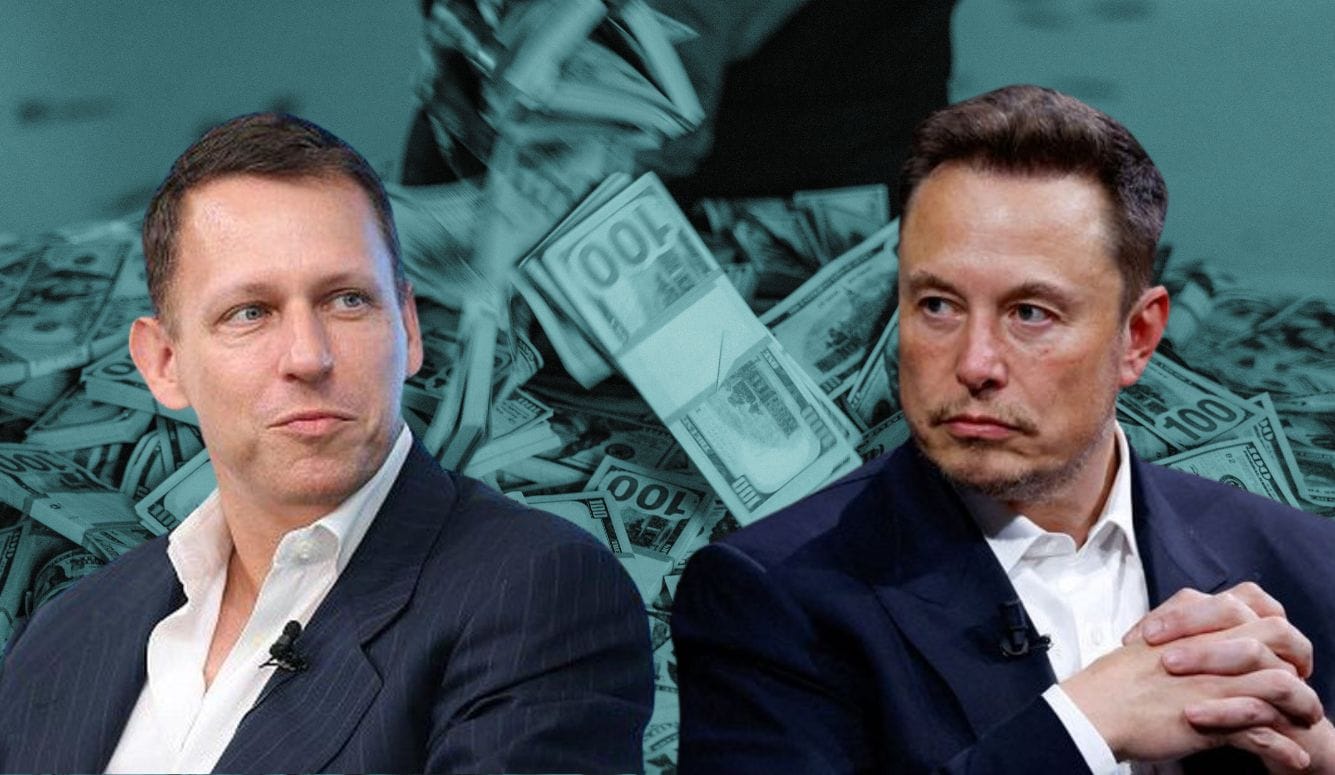Politics
The Changing Politics of Oligarchy
Liberal democracies need to restore a climate of entrepreneurial opportunity and competition.

In American politics, the main beneficiaries of “dark money” have tended to be Democrats in recent years. Google representatives are reported to have visited the White House at least 427 times during Obama’s two terms. And in 2024, big spenders like Bill Gates, Reid Hoffman, Marc Benioff, Alex Soros, James Murdoch, Michael Bloomberg, and various donors from Wall Street helped Kamala Harris raise over US$1.5 billion for her campaign, the highest figure in history. This may be starting to change as a number of powerful Silicon Valley billionaires like Elon Musk and Peter Thiel have shifted their money to the populist Republican Party.
However, political shifts like these are less important than the unprecedented degree of control that a handful of people and institutions enjoy over our communications, finances, consumer choices, and culture. In recent decades, the influence of billionaires has grown in both of America’s two main political parties. The Supreme Court’s 2010 Citizen United ruling, which essentially ended any meaningful control over campaign spending, only accelerated this trend. In 2024, election spending, in real dollars, is estimated to have been more than twice what it was two decades ago.
According to Pew Research, eighty percent of Americans now believe that wealthy donors have too much power, and they are right. Google and Apple account for nearly ninety percent of all mobile browsers worldwide, while Microsoft, Android (Google), and iOS (Apple) account for roughly the same share of all operating-system software. Three tech firms now account for two-thirds of all online advertising revenue, which in turn accounts for the vast majority of all ad sales. To find historic parallels for this kind of dominance, you have to go back to the gilded age, an era of money men and monopolists that lasted until the New Deal.
The rise of very wealthy and liberal tech entrepreneurs caused many commentators on the Right to worry that American politics would soon be dominated by an alliance of the Democratic Party and major tech firms like Meta, Google, Apple, Amazon, and Microsoft. That convergence of interests, they feared, would impose a radical progressive agenda on much of America and close down dissent across the internet and social media. Even the ex-wives, siblings, and children of tech oligarchs were now accruing enough money to become reliable funders of the Left’s agenda.
To right-wing commentators like these, Trumpist populism represents a welcome challenge to oligarchic power—an unforeseen development that they believe is changing the course of history and restoring “masculine heroism” to the national stage. But much of this change is illusory. After all, Trump’s backers in Wall Street and Silicon Valley benefit from the same corporate concentration of the economy, and while the politics of oligarchic elites may be changing, it is their influence itself that remains the larger and more pressing problem. Just as feudal lords gave to the church while they violated biblical injunctions, tech oligarchs are more interested in power than they are in ideas. Technology is just the means to secure it.
There was a time when it was widely supposed that the tech-driven “new economy” would be a fundamental improvement on the unenlightened and sluggish model it was replacing. But instead of a bountiful capitalist utopia, it resembles something closer to the powerful zaibatsu clique in imperial Japan. As Peter Thiel has observed, Google and Facebook are now essentially a duopoly and are using their power to threaten “diversity of thought.” In 2017, he reported, the two firms “accounted for 84% of all digital advertising outside China, including 96% of its growth, according to an industry forecast this month from Zenith, Magna and GroupM.”
Mike Malone, a chronicler of Silicon Valley, believes that the tech elites have shifted from “blue-collar kids to the children of privilege.” And in the process, they have lost their preoccupation with actually building things (“tubes to transistors, chips to PCs”), the accomplishment that once made the Valley so inspiring and egalitarian. Instead, an intensely competitive industry has become enamoured with the allure of “the sure thing” backed by massive capital. And if a competitor does emerge, the biggest firms simply swallow it up.
And so, the entrepreneurial spirit that created the industry has been weakened. In 2020, the Wall Street Journal reported that Amazon was mining sales data from independent sellers to develop its own products. In 2021, Google was fined billions of US dollars for giving preferential treatment to its shopping service on its search site. The following year, reports emerged that it was also manipulating browser extensions to drive customers from rival products. In 2021, a federal judge ruled that Apple “will no longer be allowed to prohibit developers from providing links or other communications that direct users away from Apple in-app purchasing,” a policy that critics had called monopolistic behaviour. As Michael Lind noted in a 2021 essay for American Affairs:
Asked once what his ideal company was, the billionaire Warren Buffett, one of the world’s richest individuals, replied: “High pricing power, a monopoly.” Economist Michael Hudson, among others, has referred to the multiplication of such arrangements as the “tollbooth economy.” In their reliance on this tollbooth economy, the lords of today’s digital-era infrastructure—“green” and “progressive” though they may be—have more in common with railroad tycoons than with the CEOs of mid-century manufacturing companies.
Ultimately, what we are seeing is an inexorable move—not conspiratorial in intent but driven by the logic of Wall Street—by a handful of firms to control an ever-wider realm of commerce, people, and attitudes. They have managed to bring an entire generation under their sway, satiated with unending streams of content. As Aldous Huxley warned in his 1932 novel Brave New World, Big Brother will not be required “to deprive people of their autonomy, maturity and history ... people will come to love their oppression, to adore the technologies that undo their capacities to think.”
The Changing Position of the Oligarchs
In his illuminating recent book The Power and the Money, Tevi Troy notes that tech entrepreneurs tended to disdain politics until recently. But a rising tide of regulation finally forced them out of their cubicles and into the top ranks of big party donors. Political debates about antitrust, consumer protection, and the regulation of content had become too important and consequential to ignore.
Most oligarchs still align with the Democrats, but last year saw a significant drift of tech investors and moguls to the GOP, a move accelerated by the policies of the Biden administration. Although he campaigned as a moderate, Biden ended up embracing an ultra-progressive program that sought to undermine fossil fuels, promote racial quotas, impose censorship on the internet, and (most ghastly of all to the ultra-rich) increase taxes, particularly on capital gains.
Biden also embraced the idea of regulating mergers, a move that alienated many investors and new company founders. Someone like Jeff Bezos may dislike Trump’s manner and methods but he dislikes regulations more, and he has been delighted to see the new SEC regulator Gail Slater rescind those imposed by her predecessor, Lina Kahn. Biden administration attempts to limit AI competition unsurprisingly alienated investors like Marc Andreessen. And if Google continues to genuflect before Trump, it will not have to worry about its record US$32 billion acquisition of cloud-security firm Wiz, yet another conquest of a promising firm.

For the most part, this allegiance to Trump is simply a pragmatic marriage of convenience. If the Trump administration eventually self-destructs (as presently seems likely), tech money will simply move elsewhere as it attempts to advance the interests of the industry and its entrepreneurs. Democrats will continue to draw their support from the economy concentrated in Hollywood, Wall Street, and Silicon Valley, and they will surely be able to count on support from firms like Alphabet (Google), Meta, and Microsoft, whose now-retired founder Bill Gates provided the Harris campaign with a cool US$50 million.
But some of the fissures in the tech and financial elite may endure. Elon Musk gave Trump’s campaign an estimated US$238.5 million, and his involvement in politics has only deepened since the US president entrusted him with downsizing the federal behemoth. Trump’s cabinet and close circle also includes people like David Sacks, the administration’s new crypto tsar, who come from outside the corporate elite.
Figures like these do seem to have made an ideological break with the Democratic Party, and their disenchantment will only be reinforced by attacks from parts of the liberal and progressive press. In February, a Cape Town writer published an absurd op-ed in the New York Times in which he attempted to portray Musk and Sacks (both originally from South Africa) and Tiel (originally from Namibia) as apartheid-era racists:
Mr. Musk is one of a number of reactionary figures with roots in Southern Africa who found an unlikely home in Silicon Valley and now wield disproportionate influence in shaping American and global right-wing politics. These men, such as Peter Thiel and David Sacks, emerged from a historical tradition that revered hierarchy and sought to sustain racial and economic dominance, only to find themselves in a world where that order was unraveling. Their politics reflect an instinct to preserve elite rule, cloaked in the language of meritocracy and market freedom, while channeling resentment toward new power structures they view as threats to their position.
What Divides the Oligarchs?
Fissures have also emerged within the oligarchic elite based on how firms and their CEOs make money. Democrats have generally aligned with those firms that provide social media, entertainment, and software solutions rather than hardware. Companies like these—Meta, Apple, Amazon, Microsoft, and even Nvidia—build very little in America so they have less need for emissions waivers, factory sites, skilled blue-collar workers, or extensive skills training.
There is also a divergence in attitudes towards the nation state. Many CEOs in Silicon Valley and Wall Street recoil from Trump’s promise to use trade protectionism to reshore businesses that import from overseas. In their recent book, The Technological Republic, Alexander Karp (co-founder of tech defence firm Palantir) and Nicholas Zamiska point out that many in the tech elite believe the United States is “a dying empire, whose slow descent cannot be allowed to stand in the way of their own rise.” These firms, they continue, lack any sense of a “shared and national identity,” partly because their business exists in post-national cyberspace.
These companies are like self-sufficient empires. “During 2020,” American Affairs has reported, Apple, Google, Amazon, Facebook, and Microsoft “raked in a combined $1.072 trillion in revenue, more than half the revenues of all fifty state governments combined. Both Apple and Amazon, with $274.5 billion and $386 billion, respectively, even managed to comfortably outstrip the revenues of notoriously big-government California.” Some even boast market capitalisations greater than the annual GDP of countries like Italy, Brazil, Canada, Russia, and South Korea.
And like emperors in the late Roman Empire, they are willing to cut whatever deals are required to advance their interests. Apple’s US$275 billion deal with China guarantees the firm’s continued dependence on the Middle Kingdom and promises to hand over technology to the authoritarian regime. As Reuters reported, “Coerced technology transfer in exchange for market access is a point of major diplomatic friction between China and its trade partners, but many executives accept it as a cost of doing business.”
The tech shift to the Right, on the other hand, is partly driven by pious patriotism and partly by self-interest. Unlike the post-national, post-industrial firms that have rallied to the Democrats, the core of Trump’s tech support comes from companies that still rely on US production. This most obviously includes Elon Musk, the most important industrialist in the country given his involvement in Tesla and SpaceX. Musk could yet become a key force of US military power if Starships are used to move troops and materiel at record speed.
Musk and other “defence bros”—like Palantir co-founders Joe Lonsdale and Peter Thiel and Anduril’s Palmer Luckey in places like Texas, Florida, and Southern California—could become a durable MAGA-friendly tech base. Military tech and national space projects must be built in America and they require factory space, skilled workers, and reasonable housing costs.
Emerging Conflicts
However, it bears repeating that oligarchs have no permanent politics, just interests, and they derive their power from the growing impact of technology and their consequent control of information and the means of digital communication. Like feudal lords, they shift alliances to fit their immediate needs. Most of them seem to despise Trump, and Harris racked up large margins among the big tech firms’ employees and in places like the Bay Area and Puget Sound. Still, they tripped over themselves to pay fealty after the 2024 election landed them in a new political reality.
If the centre-left decisively rejects the loopy dogma on race and gender that has poisoned the Democratic brand, many of the companies that have flocked to the GOP may return to the Democratic Party. The GOP’s tech/populist coalition is unstable, particularly as the creative destruction caused by tech developments in AI and automation may inflict economic pain on parts of the MAGA base. Indeed, MAGA’s unofficial spokesman Steve Bannon is already predicting that opposition to Trumpist populism is likely to lead the tech sector to return to the Democrats.
After Trump leaves office—or if the populist moment burns out before then—Tim Cook’s recent promise to invest in America will likely vanish before the exigences of ever-growing profit. In return, the Democrats may have to abandon the regulatory policies unleashed by Biden that helped create populist venture capitalists like Mark Andreessen. It remains to be seen if that is a political price Democrats are prepared to pay.
An Opportunity for the Third Estate?
For now, conflict is likely to grow among oligarchs, marked by massive funding of political campaigns on both sides. Much of this money is likely to be spent trying to stem the socialist tide in the Democratic Party—particularly if the GOP remains committed to MAGA populism, which will increasingly find itself at odds with the interests of the elite capitalist class. But the public is increasingly sceptical of the tech zaibatsu, citing privacy and censorship concerns, and populists on the Right and the Left may be able to exploit divisions in the oligarchy to advance a shared agenda.
Curbing oligarchic power will also be essential to restoring the promise of liberal capitalism. The current order is minting money but it is not benefitting the populace. Today, roughly half of all US spending comes from the top ten percent, compared to a third thirty years ago, while corporate bonuses have skyrocketed, reaching a peak at the end of the Biden administration. To survive, liberal capitalism will need to escape the domination of an oligarchic elite and restore a climate of entrepreneurial opportunity and competition. Otherwise the oligarchs will continue to dominate our political systems and economies. This constitutes the great challenge faced by democracies in an oligarchic age.





